- Home
- Juliet Marillier
Wildwood Dancing Page 30
Wildwood Dancing Read online
Page 30
“I’m not accepting this,” Cezar said, glaring at him. “What about all the work I’ve done: looking after the business, watching over the girls, organizing the hunt for the Night People? You can’t just walk in and take it all!”
“Watching over the girls?” The last of the warmth had gone from Costi’s voice. “Have you forgotten that I’ve been here all the time? I saw you set guards on them and threaten them. I watched you crush Paula’s aspirations and rob the valley of its good priest. I saw you humiliate Iulia. I saw you put your clumsy paws on Jena and expect her to like it. Being a frog didn’t relieve me of my intelligence or my powers of observation.”
“You piece of pond scum!” hissed Cezar. “You think you can march in here and help yourself to everything! You don’t deserve to be master of Vǎrful cu Negurǎ: you haven’t done a scrap of work to earn it—you don’t know the first thing about running the business! All you know about is …”
“Being a frog?” Costi raised his brows. “Believe me, if there had been any choice in the matter, I would have stayed in human form. In fact, I don’t think I’ll have as much difficulty picking up the reins as you believe. What Jena learned about the business, I learned, too. Her shoulder made an ideal vantage point for reading all those ledgers.”
I was watching Cezar’s face—pale as parchment and distorted with outrage. Before my horrified gaze, something snapped. He strode forward to seize his brother by the throat. I screamed. Costi struggled, long limbs thrashing. His face turned crimson as he fought for air. His eyes bulged. Cezar was backing him toward the high stone wall by the hen coop. Drǎguţa stood quietly, watching the two of them.
“It’s her fault, that witch’s, she tricked me!” Cezar babbled. “It was supposed to be mine, all of it, the estate and Jena, too, that was what it meant, King of the Land, but it was a hollow promise! Even with you gone, I could never be more than second best! It’s wrong! Wrong!” With each repetition he shook Costi as if he would smash his head against the stone.
Nobody was coming out: my screams had not brought a single guard. “Stop it!” I yelled. “Let him go!” I grabbed Cezar’s arm in a desperate effort to intervene. The game was not supposed to end with me watching one brother kill the other, right before my eyes—it could not be so. “Stop it, Cezar!”
Cezar knocked me away and I fell, painfully, onto the stones of the courtyard. In the moment’s respite allowed him, Costi performed a sharp upward jab with his knee. Cezar sucked in air—his grip slackened. Quick as a flash, Costi wriggled out of his brother’s hold and retreated, both hands up in front of him, palms out. “Enough,” he wheezed. “You don’t want to do this.”
“The game is finished.” Drǎguţa’s voice was solemn. Her gooseberry-green eyes moved over each of us in turn: me struggling to my feet, Costi gasping for breath, and Cezar just standing there with a look on his face that made me want to cry. He had made his choice, it seemed, and it was a waste—a waste of what could have been a good life.
“My work is done here,” the witch said. Basket over her arm, she turned and trudged away across the yard as if she were indeed just another wanderer who had passed by, hoping for a crust of bread or a few coppers. None of us said a thing.
When she was gone, Costi cleared his throat and looked his brother in the eye. “We’re going home now,” he said, and his voice was as bleak as winter. “I’m sorry you are not prepared to accept me. I never forgot that we were brothers, even as I watched you bully the girls and mismanage Father’s affairs. After this, I don’t want you anywhere near our cousins, Cezar. We’ll discuss what few options are still available to you. Come—I’m certain Jena is longing to see the last of us.”
I opened my mouth to speak, to say something—anything—for the look Costi turned on me was tight and hurt and made me want to curl up and cry. But I didn’t say a word, for someone was coming on horseback, and the moment was over. Into the courtyard rode the gray-bearded figure of Judge Rinaldo, and after him a familiar figure seated sideways on her fine mare, her face pale and tense. It was Aunt Bogdana. She slid down from her horse, her gaze on Costi. As she came across to him, first walking, then running, I saw a wondrous sequence of expressions cross her face: utter trepidation, reawakening love, transcendent joy. She threw herself into his arms, hugging him like the child he had been when she lost him, and Costi held her with tears streaming down his cheeks. My own face was wet; I scrubbed a hand across it.
“Jena,” Judge Rinaldo said, “my apologies for coming without warning. Your aunt passed by on her way home, and I felt obliged to explain to her what had occurred. I offered to escort her straight here, since I knew that Costin was coming up to see his brother. This will silence doubting tongues. Nobody can dispute that a mother knows her son.”
I murmured something polite, hardly hearing him. Cezar was watching his mother sobbing in Costi’s embrace. Over Aunt Bogdana’s shoulder, Costi’s eyes looked into his brother’s. What I saw in them was as much sorrow and regret as judgment. I did not think Cezar recognized that. He saw only confirmation of what he knew already: that he would never be more than second best. His mouth tightened. Turning on his heel, he strode off across the courtyard and away down the track toward the forest. He seemed hardly aware of what he was doing. It was almost night; the shadows swallowed him quickly.
“I hope this matter will not create confusion and discord at Vǎrful cu Negurǎ,” said the judge. “The valley sorely needs a time of peace, and it needs its leaders.”
“I know I’ll have to work hard to gain the community’s trust,” Costi said. “I’ll try my best to do things the way my father did—with wisdom and compassion.” He patted his mother on the back. Aunt Bogdana was laughing and crying at the same time. I doubted that she had noticed Cezar was gone. “I hoped that my brother … I did hope—” Costi seemed to gather himself together. “We’ve all suffered some blows this winter. It cuts deep to lose the trust of those who were once dearest to the heart. I think that is a wound that can never heal.”
I felt the poisoned arrow of his words right in my heart: it hurt more than I could have imagined possible. He sounded so sad, and so unforgiving. I stood silent, shivering.
“Judge,” Costi went on, and now his tone was that of a leader, “I thank you for your help and your belief in me, and for bringing Mother here so promptly. Jena, I’ll take most of the guards up to Vǎrful cu Negurǎ with me. I’m sure you can’t wait to have your house to yourself again.”
There were plenty of things I could have said, but all I did was mutter, “I’ll find Petru for you,” and head back indoors as folk began, at last, to spill out of the castle to see what was going on. I did not know what I was feeling, only that my heart was being torn in all directions at once. Furious tears welled in my eyes. Those words about trust had been cruel. It sounded as if he’d decided he wouldn’t even try to forgive me. Perhaps we would live our lives a stone’s throw from each other, never exchanging so much as a friendly greeting.
I sent a bemused Petru to sort out guards and horses. As briefly as I could, I told my sisters and Florica what had happened. I could see that they were bursting with questions, but instead of asking them, the girls tiptoed around me, eyeing me warily as I helped set the table for supper, crashing plates and jangling cutlery. Whatever story my face told them, it didn’t have a happy ending.
A strange quiet settled over Piscul Dracului. Cezar was gone. He had not waited to talk further to Costi or to bid Aunt Bogdana farewell, but had left the valley that very night. Nobody knew where he had gone. The guards had departed, leaving our household at seven once more: we sisters, Florica, and Petru. The earliest traces of spring were touching the forest, cautious yet, for the winters were long in our mountains: a clump of tiny wildflowers, a bird bearing a beakful of dry grasses for its nest. Insects on a pond; the hens starting to lay again.
From Ivan, who traveled to and fro, we heard news of Costi in those first weeks after his return. He was working hard to es
tablish himself as master of Vǎrful cu Negurǎ, and to take the reins of Uncle Nicolae’s business affairs. Aunt Bogdana was torn between joy and sadness. She had found one son, only to lose the other. She did not invite us to visit, and we did not walk up to her house. All the same, we could not be unaware of Costi’s presence so close to Piscul Dracului. Small reminders kept coming. One day not long after Cezar’s departure, two men rode into our courtyard bearing our strongboxes: one for the family expenses, one for the business. A third man brought a stack of ledgers, which he obligingly carried up to the workroom for me. Everything Cezar had taken was being scrupulously returned.
The business coffer was entirely in order, containing both ample funds and full receipts for Salem bin Afazi’s goods. The household box had more silver in it than it had when Cezar took it, but not enough to embarrass me. I judged that Costi had calculated an amount that would see us comfortably through the next three months or so, well past the time we hoped Father would be home. The gesture was generous and sensitive. It was just what I would have expected from Gogu—and from Costi—and it made me feel both relieved and ashamed.
“You can’t go on blaming yourself forever,” Iulia told me bluntly one morning as we were feeding the chickens. “So you didn’t trust him straightaway. I can understand why he was upset, but you did have a very good reason for it.”
“Evidently Costi doesn’t think so,” I said, throwing out a handful of grain. “He remembers when he was Gogu, and the way the two of us trusted each other more than anything. We were so close, and now that seems to be gone, gone as if it never was.”
Iulia glanced at me sidelong. “Didn’t you say he threatened to kill Cezar if he hurt you again? He loves you, Jena. It’s obvious to the rest of us. All you need to do is go up there and say you’re sorry.”
“I can’t.” The very idea of it made my stomach tie itself in knots. If he spoke to me again the way he had that day in the courtyard, it would be more than I could bear.
“So you plan to be enemies for the rest of your lives?” Iulia asked me. “That could be awkward, with him living next door.”
“I don’t plan anything,” I said. “I’m too worried about Tati even to think about Costi.” Not true, of course; I thought about him all the time—and if I could have rewritten the past, I would have.
As for Tati, we were all worried about her. She had barely spoken a word since Full Moon, and she was eating scarcely enough to keep a bird alive. Her cheeks were hollow and her eyes looked too big for her face. I thought she was living the quest with Sorrow, that she was attuned in some way to his journey and his struggle, every part of her fixed on bringing him safely back, his mission complete. As the moon had gone from full to gibbous to dark, she had retreated gradually into a shadowy world of her own. It seemed to me she was letting go, slipping away to a place where we would not be able to reach her.
I heard from Ivan that there was talk in the valley about which sister had kissed the frog back into a man and what the likely outcome might be. He said nothing about a portal or nocturnal journeys, and neither did folk in the village, although we did attract some curious looks. Whatever version of events Costi had told Judge Rinaldo, it seemed that the full truth had not come out, and I was glad of it.
At Dark of the Moon I dreamed not of a young man who turned into a monster, but of Tadeusz, with his cynical smile and wandering fingers. He was saying to me, You missed your opportunity, Jena. Now what? Marriage to some worthy young landholder, and a baby in your belly every spring? You can do better than that. I’m not far away. Just wish for me, and I’ll be there. I woke in a cold sweat.
Tati’s side of the bed was empty, and the door ajar. Heart in my mouth, I threw on my cloak and ran through the darkened house, straight up the steps at the end of the party room and out onto the terrace.
She stood there in her night robe, looking out over the dark forest. Alone: no cloaked figure by her side. I breathed again.
“Tati, what are you doing? It’s freezing out here. Come back inside.”
She said nothing. I went up to her, taking off my cloak to put it around her shoulders. I felt a deep shivering in her. Her eyes were blank.
“Come on, Tati. Step by step, that’s it. Come with me.”
Back in the bedchamber, I put the quilt around her and sent Iulia, who had awakened at our return, down to the kitchen for dried berries so we could make fruit tea. I set the small kettle on our stove. After a while, Tati’s trembling subsided. She said in a whisper, “I had a terrible dream, Jena. I think Sorrow’s hurt. I don’t think he’s coming back.”
“Tell me. Remember, dreams aren’t always true.”
“He was fighting some kind of monster, like a wild boar, only much bigger, and he … he fell, and the thing gored him with its tusk.… He was bleeding, Jena. He was just lying there in the mud. He looked so pale, as if he was already dead.… And I couldn’t do anything. I couldn’t touch him, I couldn’t even say goodbye.…”
“Shh … shh … Don’t think about it anymore. It doesn’t mean anything, Tati, just that you’re worried about him.”
“He’s not coming back,” my sister said flatly, staring into space.
After that she stopped eating altogether. Already she was skin and bone, her appetite whittled away to a nibble of fruit here, a morsel of bread there. Now she refused to touch anything. I could hardly get her to swallow a sip of water. Logic got me nowhere. I told her again that what she had seen was only a dream, not reality, that with half the month still to go, Sorrow had a good chance of getting back in one piece with all the required items. I had scant grounds for such confidence, after what Paula had said about the quest. But I knew the importance of hope. If there was a decision somewhere in what I was saying, I did not acknowledge it even to myself.
As Full Moon drew closer, Tati became too weak to get out of bed. I sent for a doctor. We had one in the valley, an old man who had once traveled with great armies on the march, and whose skills ran more to bone setting and stitching up knife wounds than to tending young ladies fading away for no apparent reason. He applied leeches; the treatment effected no visible change. He suggested bleeding the patient, but I said no, for it seemed to me she was too frail to endure it. My heart was chill. When I had made my confident assurances to Father that I could look after things in his absence, I never dreamed that I would be watching Tati dying before my eyes. It seemed we might lose her even before we knew whether Sorrow had achieved his quest. I spent a lot of time praying, and even more time thinking.
Florica had heard about the rumors in the village. She did not actually ask us whether our sister may have been bewitched by forces from the Other Kingdom, but she climbed the steep stairs to our bedchamber and festooned the place with plaits of garlic, enough to keep out anything that might conspire to snatch Tati away from us. She put a hand to Tati’s brow and looked closely at her neck—something I had not been brave enough to do myself—and then she went back downstairs. Her expression troubled me: it combined grief and acceptance.
“What will you do when Full Moon comes?” Paula asked me as we sat by Tati’s bedside one evening, listening to the labored sound of her breathing.
“What will I do?”
“It’s not an unreasonable question. You usually do make the decisions, Jena. Do you think Sorrow will come? If he does, how can she go across? She’s barely conscious. She won’t be able to walk.”
“I know that.”
“So what if he does come, and there’s some way he can take her? Will you let her go?”
I gazed down at Tati. “It’s not my choice,” I said, realizing that I had learned that much from all this. “It’s Tati’s and Sorrow’s. I don’t know what we’ll do.” I knew whose advice I wanted. I knew whose support I needed. But I wouldn’t go to Vǎrful cu Negurǎ. I couldn’t ask him. There was too much between us: too much love, too much hurt, too much misunderstanding. We’d made a gap too wide to bridge.
“Is Tati going to d
ie?”
I had not heard Stela come in. She stood at the foot of the bed, her eyes on our sister’s fragile form—the tight-stretched skin, the shadowed lids.
“I hope not.” I wasn’t prepared to lie to her.
“Doesn’t she believe in true love anymore?” Stela asked.
The moon grew from new to half to almost full again, and the first lambs were born. Men came up from the village to help Petru, willing and able now I could pay them a fair wage. Tati was sinking steadily. I knew she could not last many days more unless we could get her to eat something—a little soup, a sliver of cheese. But she refused everything.
Not knowing what else to do, we told stories of true love in an effort to coax hope back to Tati’s heart. It was often hard to tell whether she could hear them, for she lay mostly limp and unresponsive. Late one afternoon, when Stela was down in the kitchen, Paula told a striking tale she had heard among the scholars of the Other Kingdom. The sun had almost set beyond the green window; the light in our chamber was mellow. Green as grass, I thought, green as pondweed, green as home. Maybe I was the one who needed to believe in true love.
Paula’s was a dark tale, in which a father desired his daughter. She fled to conceal herself in the kitchens of a great house, ash smeared on her face, her body hidden by a coat of many small skins—rabbit, fox, stoat, mole, badger. She fell in love with the young master of the house, and drew his attention with a series of gifts.
“So she dropped her gold ring in the bowl of broth, and gave it to the kitchen maid to place before the young lord at table. And this time, he demanded to know who had served the soup, and where he might find her.…”
When Paula reached the end of the story, Tati’s eyes were open. It was the first time in days she had shown any awareness of her surroundings. I took her hand and felt her fingers squeeze mine weakly. They were deathly cold. It came to me that if I said the wrong thing, she would shut her eyes again and sink away beyond reach. Paula’s story had sown a seed in my imagination.

 Den of Wolves
Den of Wolves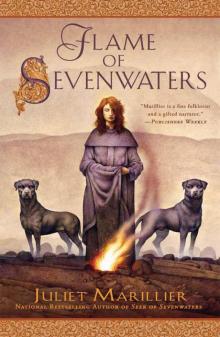 Flame of Sevenwaters
Flame of Sevenwaters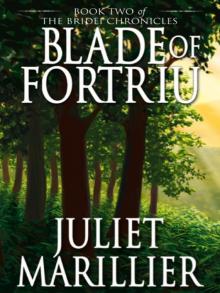 Blade of Fortriu
Blade of Fortriu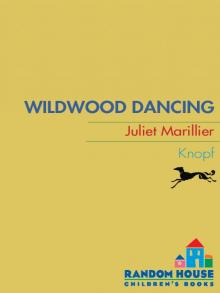 Wildwood Dancing
Wildwood Dancing Dreamer's Pool
Dreamer's Pool Raven Flight
Raven Flight Heir to Sevenwaters
Heir to Sevenwaters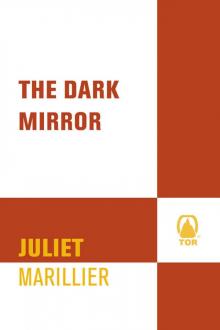 The Dark Mirror
The Dark Mirror Daughter of the Forest
Daughter of the Forest Seer of Sevenwaters
Seer of Sevenwaters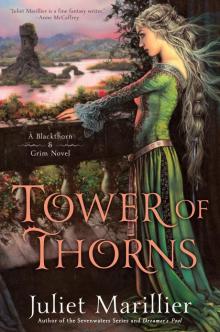 Tower of Thorns
Tower of Thorns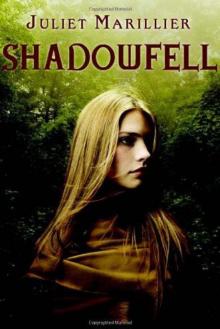 Shadowfell
Shadowfell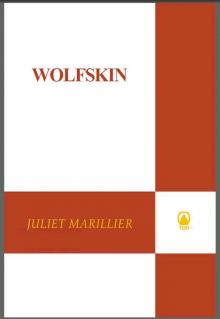 Wolfskin
Wolfskin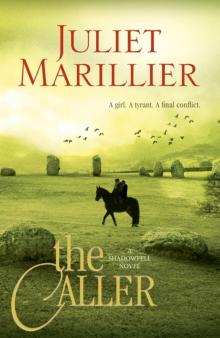 The Caller
The Caller Foxmask
Foxmask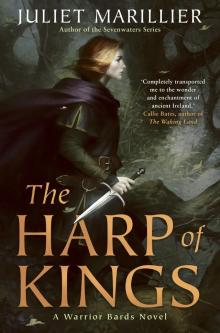 Harp of Kings
Harp of Kings The Well of Shades
The Well of Shades Heart's Blood
Heart's Blood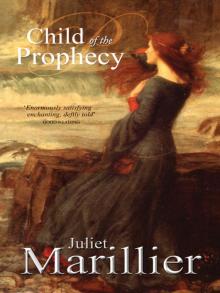 Child of the Prophecy
Child of the Prophecy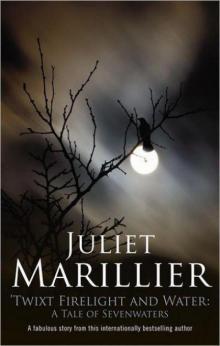 Twixt Firelight and Water
Twixt Firelight and Water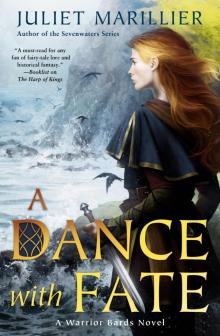 A Dance with Fate
A Dance with Fate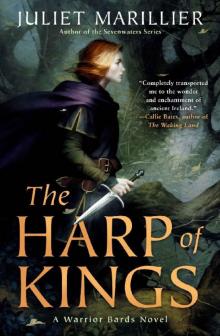 The Harp of Kings (Warrior Bards)
The Harp of Kings (Warrior Bards)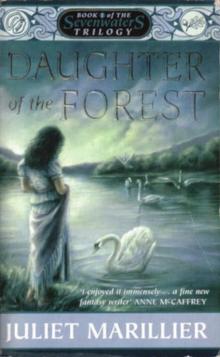 Daughter of the Forest (The Sevenwaters Trilogy)
Daughter of the Forest (The Sevenwaters Trilogy)![Sevenwaters [06] Flame of Sevenwaters Read online](http://i1.bookreadfree.com/i2/04/08/sevenwaters_06_flame_of_sevenwaters_preview.jpg) Sevenwaters [06] Flame of Sevenwaters
Sevenwaters [06] Flame of Sevenwaters![[Sevenwaters 04] Heir to Sevenwaters Read online](http://i1.bookreadfree.com/i2/04/12/sevenwaters_04_heir_to_sevenwaters_preview.jpg) [Sevenwaters 04] Heir to Sevenwaters
[Sevenwaters 04] Heir to Sevenwaters